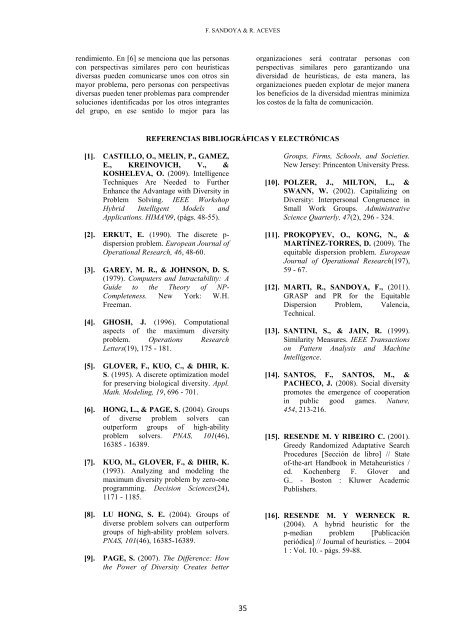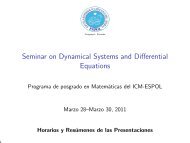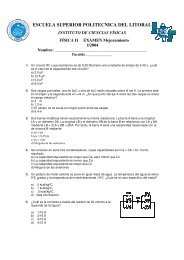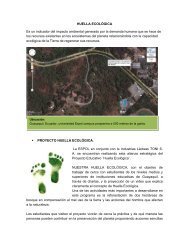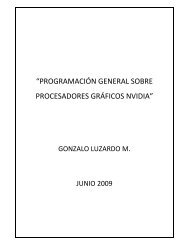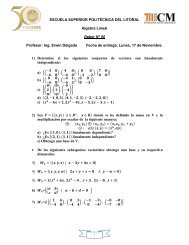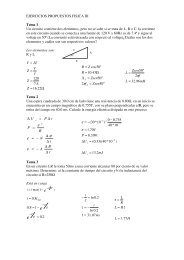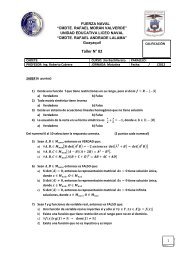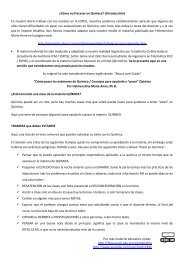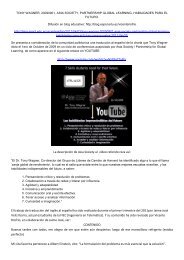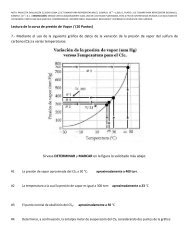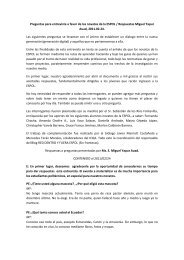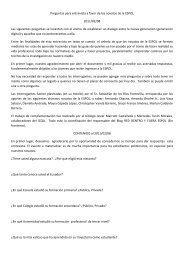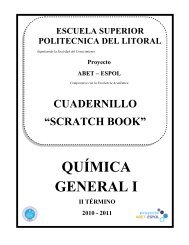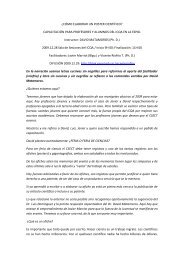matemática - Blog de ESPOL - Escuela Superior Politécnica del Litoral
matemática - Blog de ESPOL - Escuela Superior Politécnica del Litoral
matemática - Blog de ESPOL - Escuela Superior Politécnica del Litoral
Create successful ePaper yourself
Turn your PDF publications into a flip-book with our unique Google optimized e-Paper software.
endimiento. En [6] se menciona que las personas<br />
con perspectivas similares pero con heurísticas<br />
diversas pue<strong>de</strong>n comunicarse unos con otros sin<br />
mayor problema, pero personas con perspectivas<br />
diversas pue<strong>de</strong>n tener problemas para compren<strong>de</strong>r<br />
soluciones i<strong>de</strong>ntificadas por los otros integrantes<br />
<strong>de</strong>l grupo, en ese sentido lo mejor para las<br />
F. SANDOYA & R. ACEVES<br />
35<br />
organizaciones será contratar personas con<br />
perspectivas similares pero garantizando una<br />
diversidad <strong>de</strong> heurísticas, <strong>de</strong> esta manera, las<br />
organizaciones pue<strong>de</strong>n explotar <strong>de</strong> mejor manera<br />
los beneficios <strong>de</strong> la diversidad mientras minimiza<br />
los costos <strong>de</strong> la falta <strong>de</strong> comunicación.<br />
REFERENCIAS BIBLIOGRÁFICAS Y ELECTRÓNICAS<br />
[1]. CASTILLO, O., MELIN, P., GAMEZ,<br />
E., KREINOVICH, V., &<br />
KOSHELEVA, O. (2009). Intelligence<br />
Techniques Are Nee<strong>de</strong>d to Further<br />
Enhance the Advantage with Diversity in<br />
Problem Solving. IEEE Workshop<br />
Hybrid Intelligent Mo<strong>de</strong>ls and<br />
Applications. HIMA'09, (págs. 48-55).<br />
[2]. ERKUT, E. (1990). The discrete pdispersion<br />
problem. European Journal of<br />
Operational Research, 46, 48-60.<br />
[3]. GAREY, M. R., & JOHNSON, D. S.<br />
(1979). Computers and Intractability: A<br />
Gui<strong>de</strong> to the Theory of NP-<br />
Completeness. New York: W.H.<br />
Freeman.<br />
[4]. GHOSH, J. (1996). Computational<br />
aspects of the maximum diversity<br />
problem. Operations Research<br />
Letters(19), 175 - 181.<br />
[5]. GLOVER, F., KUO, C., & DHIR, K.<br />
S. (1995). A discrete optimization mo<strong>de</strong>l<br />
for preserving biological diversity. Appl.<br />
Math. Mo<strong>de</strong>ling, 19, 696 - 701.<br />
[6]. HONG, L., & PAGE, S. (2004). Groups<br />
of diverse problem solvers can<br />
outperform groups of high-ability<br />
problem solvers. PNAS, 101(46),<br />
16385 - 16389.<br />
[7]. KUO, M., GLOVER, F., & DHIR, K.<br />
(1993). Analyzing and mo<strong>de</strong>ling the<br />
maximum diversity problem by zero-one<br />
programming. Decision Sciences(24),<br />
1171 - 1185.<br />
[8]. LU HONG, S. E. (2004). Groups of<br />
diverse problem solvers can outperform<br />
groups of high-ability problem solvers.<br />
PNAS, 101(46), 16385-16389.<br />
[9]. PAGE, S. (2007). The Difference: How<br />
the Power of Diversity Creates better<br />
Groups, Firms, Schools, and Societies.<br />
New Jersey: Princenton University Press.<br />
[10]. POLZER, J., MILTON, L., &<br />
SWANN, W. (2002). Capitalizing on<br />
Diversity: Interpersonal Congruence in<br />
Small Work Groups. Administrative<br />
Science Quarterly, 47(2), 296 - 324.<br />
[11]. PROKOPYEV, O., KONG, N., &<br />
MARTÍNEZ-TORRES, D. (2009). The<br />
equitable dispersion problem. European<br />
Journal of Operational Research(197),<br />
59 - 67.<br />
[12]. MARTI, R., SANDOYA, F., (2011).<br />
GRASP and PR for the Equitable<br />
Dispersion Problem, Valencia,<br />
Technical.<br />
[13]. SANTINI, S., & JAIN, R. (1999).<br />
Similarity Measures. IEEE Transactions<br />
on Pattern Analysis and Machine<br />
Intelligence.<br />
[14]. SANTOS, F., SANTOS, M., &<br />
PACHECO, J. (2008). Social diversity<br />
promotes the emergence of cooperation<br />
in public good games. Nature,<br />
454, 213-216.<br />
[15]. RESENDE M. Y RIBEIRO C. (2001).<br />
Greedy Randomized Adaptative Search<br />
Procedures [Sección <strong>de</strong> libro] // State<br />
of-the-art Handbook in Metaheuristics /<br />
ed. Kochenberg F. Glover and<br />
G.. - Boston : Kluwer Aca<strong>de</strong>mic<br />
Publishers.<br />
[16]. RESENDE M. Y WERNECK R.<br />
(2004). A hybrid heuristic for the<br />
p-median problem [Publicación<br />
periódica] // Journal of heuristics. – 2004<br />
1 : Vol. 10. - págs. 59-88.


